Unit 2 I think that mooncakes are delicious!复习讲义 2023-2024学年人教版九年级英语全册
文档属性
| 名称 | Unit 2 I think that mooncakes are delicious!复习讲义 2023-2024学年人教版九年级英语全册 |
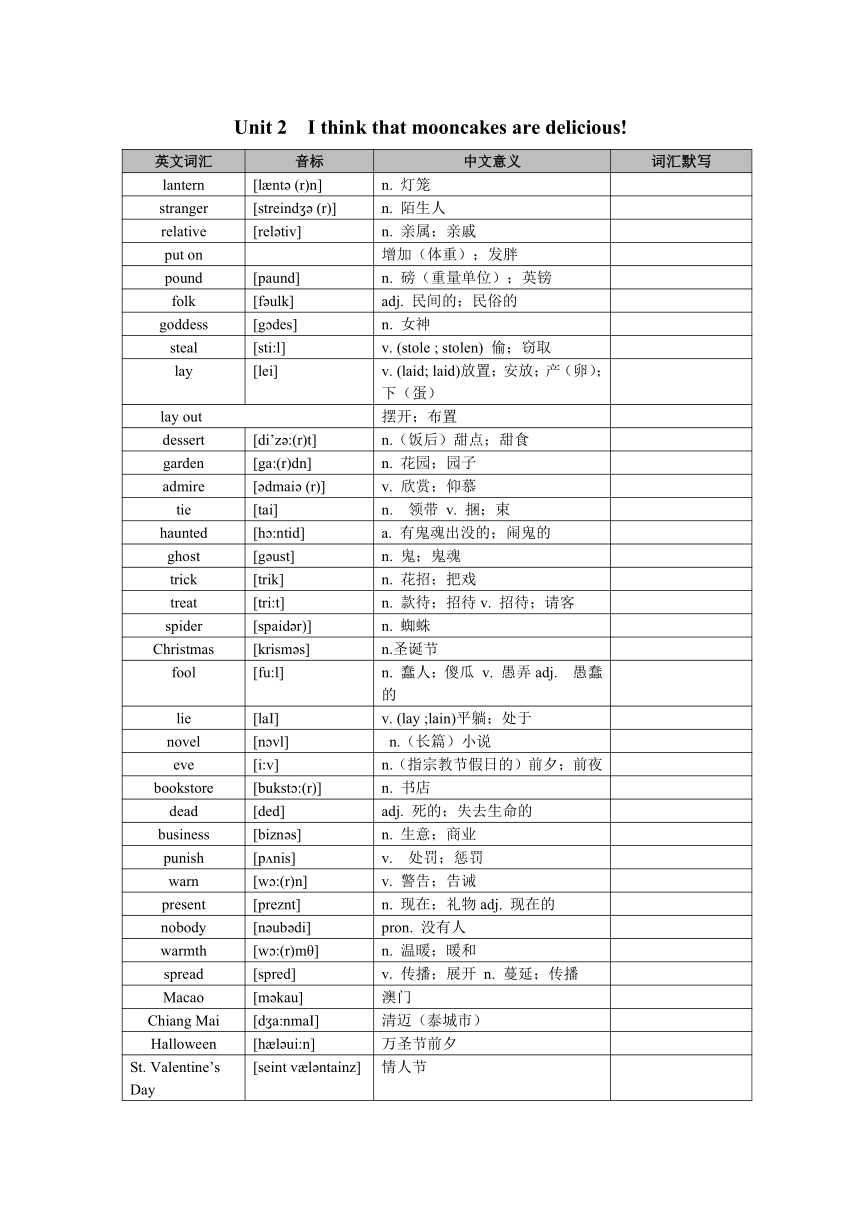
|
|
| 格式 | docx | ||
| 文件大小 | 52.4KB | ||
| 资源类型 | 教案 | ||
| 版本资源 | 人教新目标(Go for it)版 | ||
| 科目 | 英语 | ||
| 更新时间 | 2023-09-05 16:16:05 | ||
图片预览

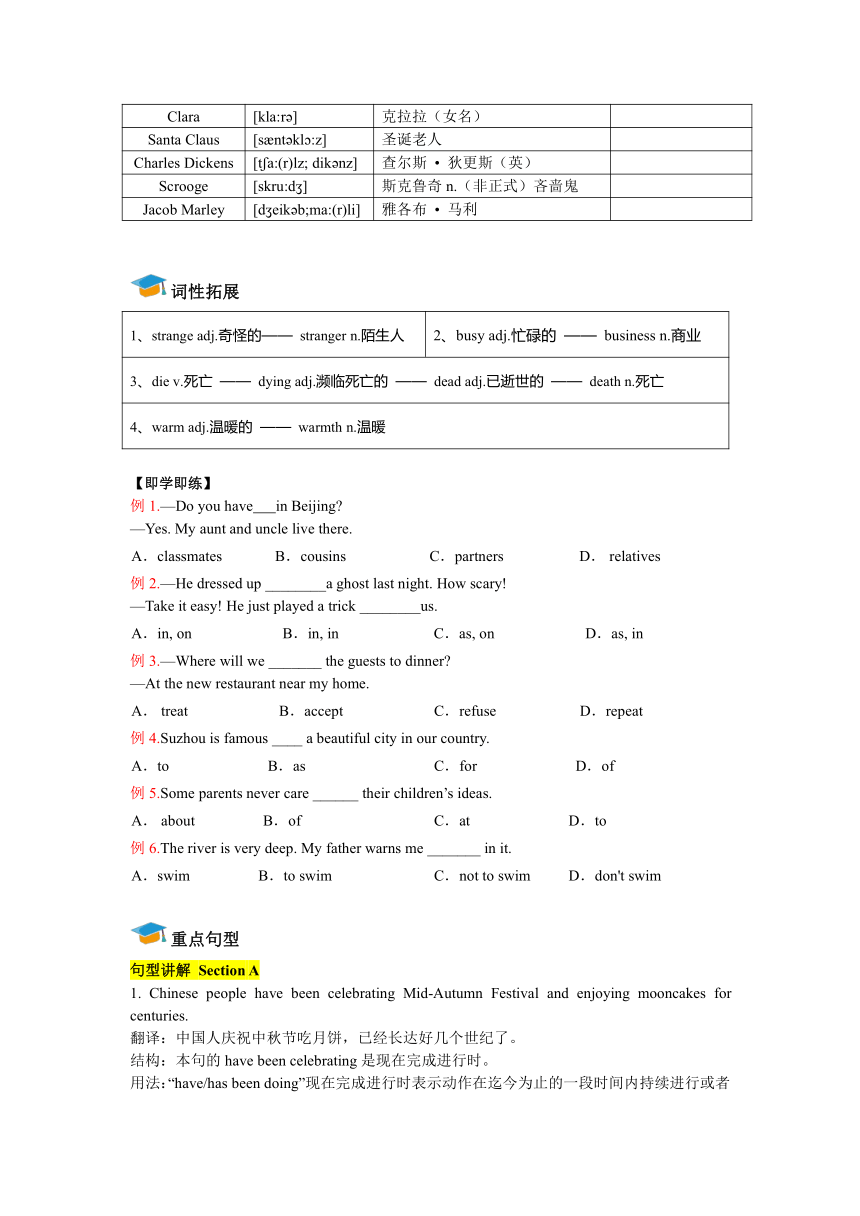
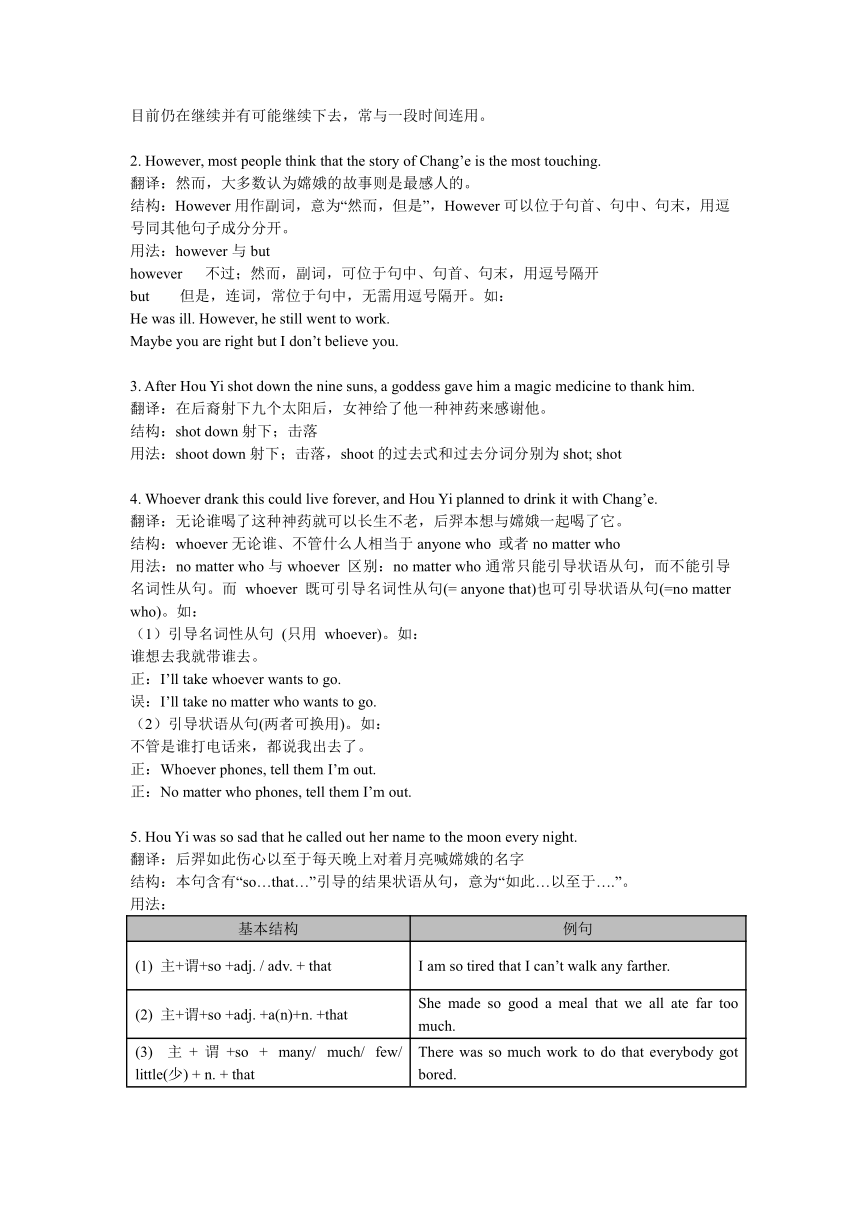
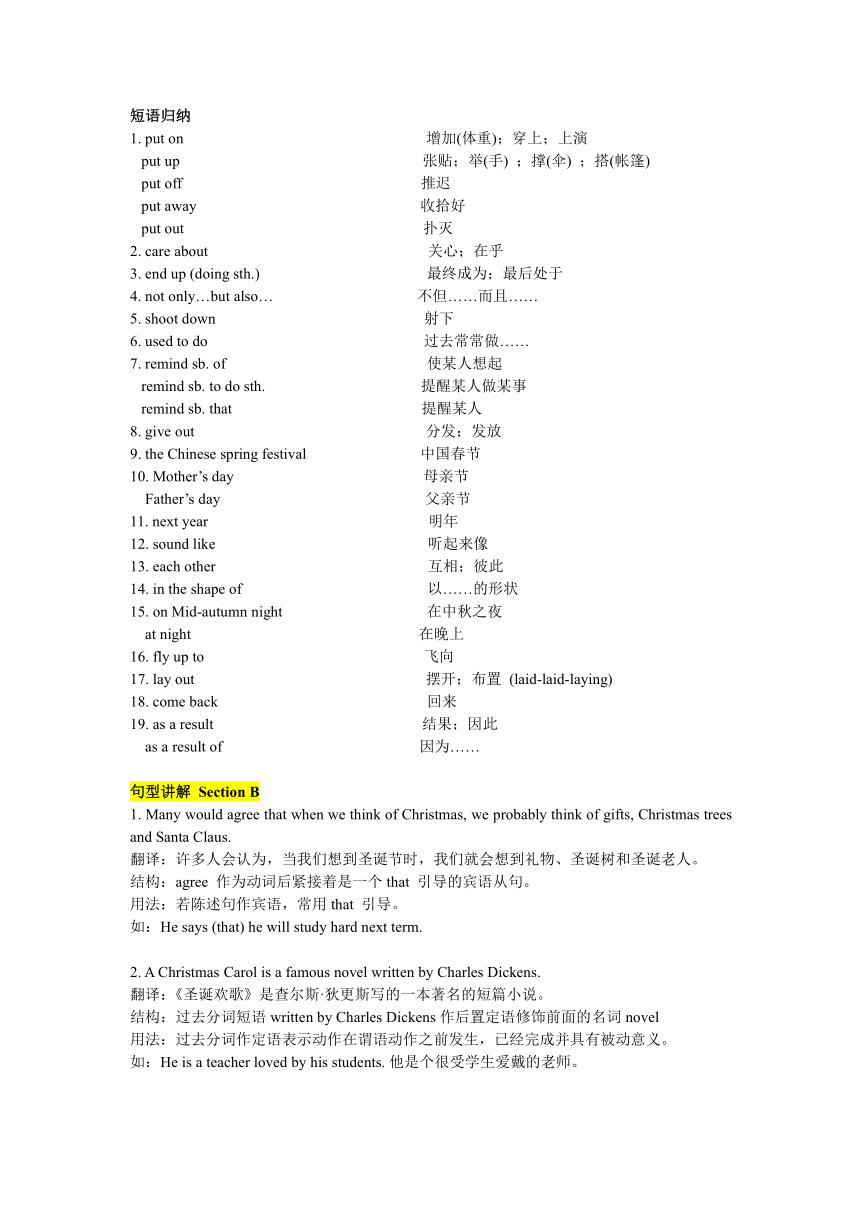
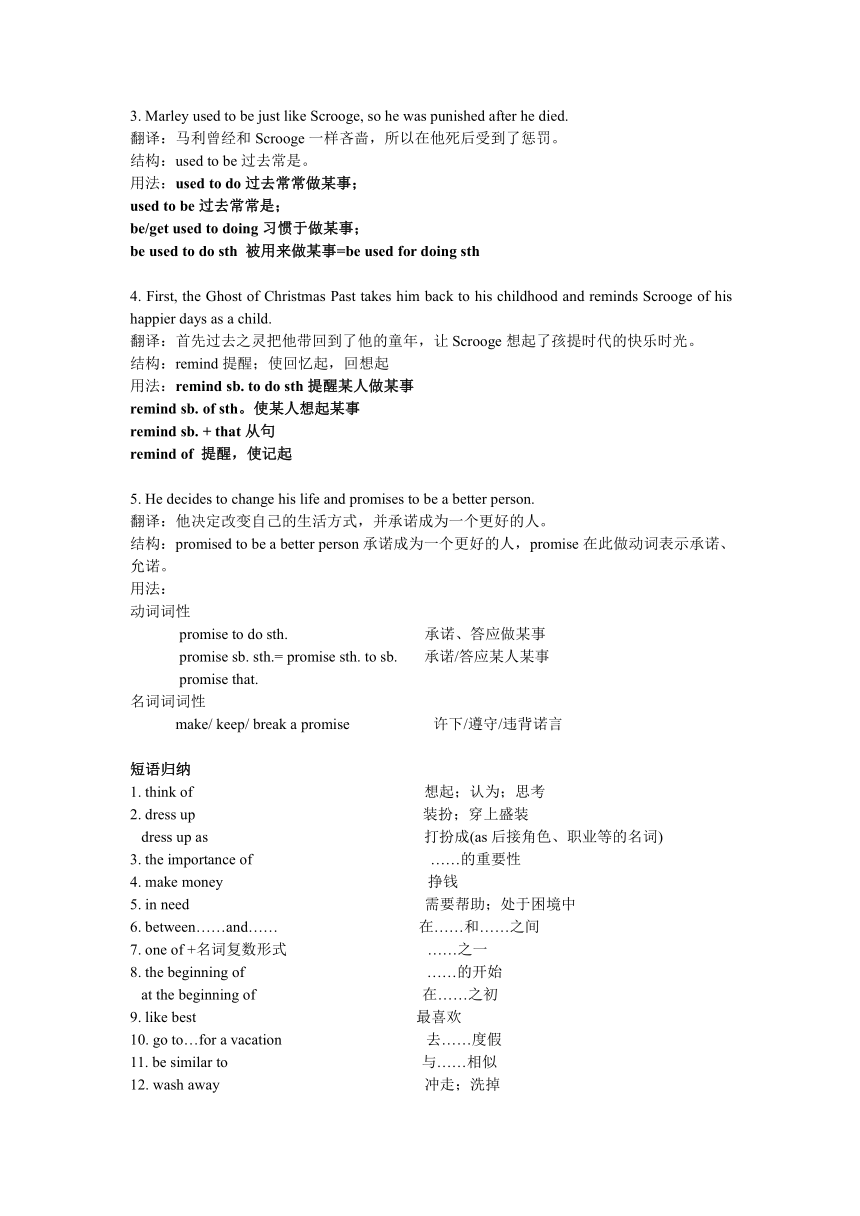
文档简介
Unit 2 I think that mooncakes are delicious!
英文词汇 音标 中文意义 词汇默写
lantern [l nt (r)n] n. 灯笼
stranger [streind (r)] n. 陌生人
relative [rel tiv] n. 亲属;亲戚
put on 增加(体重);发胖
pound [paund] n. 磅(重量单位);英镑
folk [f ulk] adj. 民间的;民俗的
goddess [g des] n. 女神
steal [sti:l] v. (stole ; stolen) 偷;窃取
lay [lei] v. (laid; laid)放置;安放;产(卵);下(蛋)
lay out 摆开;布置
dessert [di’z :(r)t] n.(饭后)甜点;甜食
garden [ga:(r)dn] n. 花园;园子
admire [ dmai (r)] v. 欣赏;仰慕
tie [tai] n. 领带 v. 捆;束
haunted [h :ntid] a. 有鬼魂出没的;闹鬼的
ghost [g ust] n. 鬼;鬼魂
trick [trik] n. 花招;把戏
treat [tri:t] n. 款待;招待v. 招待;请客
spider [spaid r)] n. 蜘蛛
Christmas [krism s] n.圣诞节
fool [fu:l] n. 蠢人;傻瓜 v. 愚弄adj. 愚蠢的
lie [laI] v. (lay ;lain)平躺;处于
novel [n vl] n.(长篇)小说
eve [i:v] n.(指宗教节假日的)前夕;前夜
bookstore [bukst :(r)] n. 书店
dead [ded] adj. 死的;失去生命的
business [bizn s] n. 生意;商业
punish [p nis] v. 处罚;惩罚
warn [w :(r)n] v. 警告;告诫
present [preznt] n. 现在;礼物adj. 现在的
nobody [n ub di] pron. 没有人
warmth [w :(r)mθ] n. 温暖;暖和
spread [spred] v. 传播;展开 n. 蔓延;传播
Macao [m kau] 澳门
Chiang Mai [d a:nmaI] 清迈(泰城市)
Halloween [h l ui:n] 万圣节前夕
St. Valentine’s Day [seint v l ntainz] 情人节
Clara [kla:r ] 克拉拉(女名)
Santa Claus [s nt kl :z] 圣诞老人
Charles Dickens [t a:(r)lz; dik nz] 查尔斯 狄更斯(英)
Scrooge [skru:d ] 斯克鲁奇n.(非正式)吝啬鬼
Jacob Marley [d eik b;ma:(r)li] 雅各布 马利
词性拓展
1、strange adj.奇怪的—— stranger n.陌生人 2、busy adj.忙碌的 —— business n.商业
3、die v.死亡 —— dying adj.濒临死亡的 —— dead adj.已逝世的 —— death n.死亡
4、warm adj.温暖的 —— warmth n.温暖
【即学即练】
例1.—Do you have in Beijing
—Yes. My aunt and uncle live there.
A.classmates B.cousins C.partners D. relatives
例2.—He dressed up ________a ghost last night. How scary!
—Take it easy! He just played a trick ________us.
A.in, on B.in, in C.as, on D.as, in
例3.—Where will we _______ the guests to dinner
—At the new restaurant near my home.
A. treat B.accept C.refuse D.repeat
例4.Suzhou is famous ____ a beautiful city in our country.
A.to B.as C.for D.of
例5.Some parents never care ______ their children’s ideas.
A. about B.of C.at D.to
例6.The river is very deep. My father warns me _______ in it.
A.swim B.to swim C.not to swim D.don't swim
重点句型
句型讲解 Section A
1. Chinese people have been celebrating Mid-Autumn Festival and enjoying mooncakes for centuries.
翻译:中国人庆祝中秋节吃月饼,已经长达好几个世纪了。
结构:本句的have been celebrating是现在完成进行时。
用法:“have/has been doing”现在完成进行时表示动作在迄今为止的一段时间内持续进行或者目前仍在继续并有可能继续下去,常与一段时间连用。
2. However, most people think that the story of Chang’e is the most touching.
翻译:然而,大多数认为嫦娥的故事则是最感人的。
结构:However用作副词,意为“然而,但是”,However可以位于句首、句中、句末,用逗号同其他句子成分分开。
用法:however与but
however 不过;然而,副词,可位于句中、句首、句末,用逗号隔开
but 但是,连词,常位于句中,无需用逗号隔开。如:
He was ill. However, he still went to work.
Maybe you are right but I don’t believe you.
3. After Hou Yi shot down the nine suns, a goddess gave him a magic medicine to thank him.
翻译:在后裔射下九个太阳后,女神给了他一种神药来感谢他。
结构:shot down射下;击落
用法:shoot down射下;击落,shoot的过去式和过去分词分别为shot; shot
4. Whoever drank this could live forever, and Hou Yi planned to drink it with Chang’e.
翻译:无论谁喝了这种神药就可以长生不老,后羿本想与嫦娥一起喝了它。
结构:whoever无论谁、不管什么人相当于anyone who 或者no matter who
用法:no matter who与whoever 区别:no matter who通常只能引导状语从句,而不能引导名词性从句。而 whoever 既可引导名词性从句(= anyone that)也可引导状语从句(=no matter who)。如:
(1)引导名词性从句 (只用 whoever)。如:
谁想去我就带谁去。
正:I’ll take whoever wants to go.
误:I’ll take no matter who wants to go.
(2)引导状语从句(两者可换用)。如:
不管是谁打电话来,都说我出去了。
正:Whoever phones, tell them I’m out.
正:No matter who phones, tell them I’m out.
5. Hou Yi was so sad that he called out her name to the moon every night.
翻译:后羿如此伤心以至于每天晚上对着月亮喊嫦娥的名字
结构:本句含有“so…that…”引导的结果状语从句,意为“如此…以至于….”。
用法:
基本结构 例句
(1) 主+谓+so +adj. / adv. + that I am so tired that I can’t walk any farther.
(2) 主+谓+so +adj. +a(n)+n. +that She made so good a meal that we all ate far too much.
(3) 主+谓+so + many/ much/ few/ little(少) + n. + that There was so much work to do that everybody got bored.
短语归纳
1. put on 增加(体重);穿上;上演
put up 张贴;举(手) ;撑(伞) ;搭(帐篷)
put off 推迟
put away 收拾好
put out 扑灭
2. care about 关心;在乎
3. end up (doing sth.) 最终成为;最后处于
4. not only…but also… 不但……而且……
5. shoot down 射下
6. used to do 过去常常做……
7. remind sb. of 使某人想起
remind sb. to do sth. 提醒某人做某事
remind sb. that 提醒某人
8. give out 分发;发放
9. the Chinese spring festival 中国春节
10. Mother’s day 母亲节
Father’s day 父亲节
11. next year 明年
12. sound like 听起来像
13. each other 互相;彼此
14. in the shape of 以……的形状
15. on Mid-autumn night 在中秋之夜
at night 在晚上
16. fly up to 飞向
17. lay out 摆开;布置 (laid-laid-laying)
e back 回来
19. as a result 结果;因此
as a result of 因为……
句型讲解 Section B
1. Many would agree that when we think of Christmas, we probably think of gifts, Christmas trees and Santa Claus.
翻译:许多人会认为,当我们想到圣诞节时,我们就会想到礼物、圣诞树和圣诞老人。
结构:agree 作为动词后紧接着是一个that 引导的宾语从句。
用法:若陈述句作宾语,常用that 引导。
如:He says (that) he will study hard next term.
2. A Christmas Carol is a famous novel written by Charles Dickens.
翻译:《圣诞欢歌》是查尔斯·狄更斯写的一本著名的短篇小说。
结构:过去分词短语written by Charles Dickens作后置定语修饰前面的名词novel
用法:过去分词作定语表示动作在谓语动作之前发生,已经完成并具有被动意义。
如:He is a teacher loved by his students. 他是个很受学生爱戴的老师。
3. Marley used to be just like Scrooge, so he was punished after he died.
翻译:马利曾经和Scrooge一样吝啬,所以在他死后受到了惩罚。
结构:used to be过去常是。
用法:used to do过去常常做某事;
used to be过去常常是;
be/get used to doing习惯于做某事;
be used to do sth 被用来做某事=be used for doing sth
4. First, the Ghost of Christmas Past takes him back to his childhood and reminds Scrooge of his happier days as a child.
翻译:首先过去之灵把他带回到了他的童年,让Scrooge想起了孩提时代的快乐时光。
结构:remind提醒;使回忆起,回想起
用法:remind sb. to do sth提醒某人做某事
remind sb. of sth。使某人想起某事
remind sb. + that从句
remind of 提醒,使记起
5. He decides to change his life and promises to be a better person.
翻译:他决定改变自己的生活方式,并承诺成为一个更好的人。
结构:promised to be a better person承诺成为一个更好的人,promise在此做动词表示承诺、允诺。
用法:
动词词性
promise to do sth. 承诺、答应做某事
promise sb. sth.= promise sth. to sb. 承诺/答应某人某事
promise that.
名词词词性
make/ keep/ break a promise 许下/遵守/违背诺言
短语归纳
1. think of 想起;认为;思考
2. dress up 装扮;穿上盛装
dress up as 打扮成(as后接角色、职业等的名词)
3. the importance of ……的重要性
4. make money 挣钱
5. in need 需要帮助;处于困境中
6. between……and…… 在……和……之间
7. one of +名词复数形式 ……之一
8. the beginning of ……的开始
at the beginning of 在……之初
9. like best 最喜欢
10. go to…for a vacation 去……度假
11. be similar to 与……相似
12. wash away 冲走;洗掉
12. wake up 醒来
14.call out 大声呼喊
15. the tradition of ……的传统
16. eat out 外出就餐
17. one…, the other… 一个……,另一个…
18. the spirit of ……的精神
19. have to 必须;不得不
20. play a trick on sb. 捉弄某人
21. give sb. sth.= give sth. to sb. 给某人某物
22. plan to do sth. 计划做某事
23. refuse to do sth. 拒绝做某事
24. warn sb. (not) to do sth. 告诫某人做某事
warn sb. about sth. 提醒某人注意某事
warn sb. against (doing) sth. 告诫某人提防某事/不要做某事
25. tell sb.(not) to do sth. 告诉某人做某事
26. decide to do sth. 决定做某事
27. promise to do sth. 承诺、答应做某事
promise sb. sth. = promise sth. to sb. 承诺/答应某人某事
promise that. 承诺/答应……
make/ keep/ break a promise 许下/遵守/违背诺言
28. make sb. do sth. 让某人做某事
29. throw…at… 把……抛向……
30. look scary 看起来很吓人
【即学即练】
例1.翻译:帮妈妈把水果和甜点摆在桌子上。
________________________________________________________
例2.翻译:他生病了,然而仍然继续工作。
________________________________________________________
例3.翻译:那位猎人举起枪,射下了那只鸟。
_____________________________________________________
例4.翻译:他有这么多书要读,以至于没有时间看电视。
______________________________________________________________
例5.翻译:这个小男孩如此可爱,每个人都很喜欢他。
______________________________________________________________
例6.翻译:她说她上周去了公园。
________________________________________________________
例7.翻译:大多数被邀请参加会议的人是我的老朋友。
________________________________________________________
例8.翻译:鲁迅写的小说很有教育意义。
__________________________________________________________
语法知识
宾语从句
(一) 什么是宾语
宾语是动作的对象或承受者,常位于及物动词或介词后面。
宾语可由名词、代词、数词、名词化的形容词、不定式、动名词、宾语从句等来担任。
(二) 宾语从句的定义
宾语从句是主从复合句的一种。
主从复合句是由一个主句和一个或一个以上的从句构成的。
主句是复合句的主体,从句仅仅是主句的一个成分,它从属于主句,不能独立。
从句在全句中充当什么成分,就叫什么从句。
宾语从句当中的从句在句中作及物动词(vt.)的宾语,或介词的宾语,或形容词的宾语。
根据引导宾语从句的不同连词,宾语从句分为三类:动词宾语从句,介词宾语从句和形容词宾语从句。
I wonder when he will come. 动宾从句
He was angry at what she said. 介宾从句
I am not sure whether it’s right or not. 形容词+宾从句
(三)宾语从句三要素
宾语从句三要素分别是:语序、时态和连接词
1. 宾语从句语序
宾语从句均用陈述语序(即正常的主谓语序):连接词+主语+谓语+其它成分。
强调一下,它的主语和谓语是陈述句的语序,不是疑问句的倒装语序。
I wonder when he will come.
*特殊情况:当连接词在从句中担当主语时,保持原有语序不变。
I wonder what is the matter with him. 连接词what/who在从句中担当主语成分,
what is wrong with it. 从句保持原有的特殊疑问句语序不变
who is your teacher. 从句中的主语
2. 宾语从句的时态
含宾语从句的复合句,主、从句谓语动词的时态呼应应包括以下三点内容:
①需要性原则
如果主句的谓语动词是一般现在时,从句的谓语动词可根据需要,选用相应的任何时态。
I don't know when he will come back. 我不知道他将何时回来。
He tells me that his sister came back yesterday. 他告诉我他姐姐昨天回来了。
②呼应性原则
如果主句的谓语动词是一般过去时,宾语从句的谓语动词只可根据需要,选用过去的某种时态(一般过去时、过去进行时、过去将来时或过去完成时)。
⑴ 主句与从句的动作同时发生,从句用过去进行时或一般过去时
She said that she was working on the Internet.
⑵ 从句的动作发生在主句的动作之前,从句用过去完成时
He didn’t know what they had come here for.
⑶ 从句的动作发生在主句的动作之后,从句用过去将来时
Jim told me he would spend his holidays in the south.
③特殊性原则
如果宾语从句所表示的是客观事实、普遍真理、自然现象或习惯性动作等,不管主句用什么时态,从句时态都用一般现在时。
Scientists have proved that the earth turns around the sun. 科学家已经证明了地球围绕太阳运转。
Our teacher said that January is the first month of the year. 我们的老师说一月是一年的第一个月。
3. 宾语从句连接词
连词 连接代词pron. 连接副词adv.
宾语从句 that
whether/if who/whom/whose/whoever/whomever/
whosever/what/which/whatever/whichever when/where/why/how/
how much/how long/
how often…
(四)that引导的宾语从句
当宾语从句是陈述句时,用连接代词that引导,that在口语、非正式文体中常被省略。
She said (that) she went to the park last week. 她说她上周去了公园。
【拓展】that不能省略的情况
1. 当宾语从句的主语是that时:
He says that that is a map o the city. 他说那是一副城市地图。
2. 当宾语从句前有插入语时:
He says, in his letter, that he misses us very much.
3. 当宾语从句是双宾语中的直接宾语时:
I can’t tell him that his father died.
(五) if或whether引导的宾语从句
当宾语从句是由一般疑问句变来时,要用连接词if或whether来引导。if和whether在句中的意思是“是否”,一般情况下二者可以互换使用。
I want to know if/whether he is waiting for me.我想知道他是否在等我。
【拓展】只能用whether的情况
①在不定式前: Whether to go there or not hasn't been decided.
②在介词后: It depends on(依靠)whether it is going to rain.
③与or not连用:They are talking about whether to go there or not.
【即学即练】
用that,what, how, if或whether填空
1.Wang Hong told _______she was cooking at 6:00 yesterday morning.
2.I wonder ________ I can get some advice from you.
3.I don’t know _______ or not they will come for our help.
4. Our geography teacher said ________ the earth goes around the sun.
5.His father is worried about ________ he lost his work.
练习2.—Excuse me, could you please tell me ______
—Sure. It’s about ten minutes’ walk.
A.how long it takes to go to the zoo
B.how far it is from here to the zoo
C. how far is it from here to the zoo
D. how long does it take to go to the zoo
练习3.I have some tickets for the basketball match. I wonder ______.
A.where you buy the tickets
B.why you like to go there
C. if you’d like to come along
D.when you watch the match
练习4.—We have no idea _______.
—It’s heard that he is Mr. Green’s son.
A.where he comes from
B. if does he live here
C.who he is
D.who is he
练习5.—Excuse me, can you tell me _______
—Sorry, I don’t know. You can go to the information desk.
A.that there is a train
B.when the train leaves
C.which train can I take
D.where does the train go
练习6.—Mum, summer holiday is coming. I wonder_______.
—How about Qinling Wild Zoo
A.where can we go B.where we can go
C.how we can go D.how we can go
书面表达
谈论节日
本单元以“节日”为话题,向大家介绍了一些古今中外节日的由来、意义及人们庆祝的方式等。旨在通过学习让学生能增强对传统文化知识的了解,同时还能了解西方国家的一些重要节日,积累跨国文化知识。具体到书面表达中,要求同学们能根据所学写关于某个节日的文章,首先应介绍节日的名称及庆祝节目的时间;然后重点介绍人们在节日期间的活动;最后可简单谈谈自己的感受。注意在写作过程中最好能用到本单元所学的重要语法知识——宾语从句。
描述节日的常用句型
①My favorite Chinese Festival is...
②It is celebrated in/on...
③During this festival, people...
④It's my favorite festival because...
⑤It makes me feel...
⑥another thing I find difficult is…
⑦I find it difficult to do sth.
⑧want to improve…
⑨want to have a better understanding of…
教材中出现的相关句型
①I think that they're fun to watch. 我认为他们看着很有趣。
②There's a water festival there from April 13th to 15th. 从4月13号到15号,那儿有一个泼水节。
③People go on the streets to throw water at each other.人们走到街道上去相互泼水。
④Mooncakes are in the shape of a full moon on Mid-autumn night.月饼呈中秋之夜满月的形状。
⑤They carry people's wishes to the families they love and miss. 他们把人们的愿望带给他们热爱和思念的家人。
⑥On these two days, American children often give gifts to their parents or take them out for lunch or dinner.在这两天,美国的孩子经常给他们的父母送礼物或者带他们去吃午餐或晚餐。
写作实例
李鑫的笔友迈克尔(Michael)对中国的传统节日很感兴趣,请你以李鑫的名义给迈克尔写一封信,
向他介绍人们在中国是如何庆祝春节的。
提示词:come, be busy doing, bad luck, stay up, welcome, jiaozi, put on, visit, lucky money
要求:
1.注意书信格式;
2.所给的提示词必须用上,可以适当发挥;3.不少于80词。
_______________________________________________________________________________
______________________________________________________________________________
______________________________________________________________________________
______________________________________________________________________________
写作指导
思路点拨
体裁: 应用文
人称: 第三人称
时态: 一般现在时
写作三步法
第1步 总体概述:春节是一个传统节日及其时间 It’s a traditional festival in China; comes in February or January.
第2步 简要介绍人们在春节到来前的活动
cleaning their houses; stay up to welcome the new year after a big dinner; ...
第3步 主要介绍人们在春节期间的活动 put on their new clothes and visit their relatives; get lucky money
参考范文
Dear Michael,
I'm glad to tell you something about the Spring Festival. Like Christmas, it happens every year, but not the same day. It’s a traditional festival in China. It usually comes in February, but sometimes it comes in January.
Before the Spring Festival, people are busy cleaning their houses. They think it means sweeping away all the bad luck. On the eve of the Spring Festival, all the families stay up to welcome the new year after a big dinner. We eat lots of delicious food, such as jiaozi—a kind of dumpling. On the first day of the new year, people put on their new clothes and visit their relatives. Kids usually get lucky money from old people. How happy we are in the Spring Festival!
Yours,
Li Xin
当堂练习
你的英国笔友Tom想要了解你最喜爱的中国节日,请你以Jerry的身份写一封回信,向他介绍中国的一个传统节日——中秋节。词数80以上。
参考词汇:Chinese lunar year阴历
_______________________________________________________________________________
_______________________________________________________________________________
_______________________________________________________________________________
_________________________________________________________________________________________________________________________________________________________________________________________________________________________________________________________________________________________________________________________________________________________________________________________________________________________________________________________________________________________________
英文词汇 音标 中文意义 词汇默写
lantern [l nt (r)n] n. 灯笼
stranger [streind (r)] n. 陌生人
relative [rel tiv] n. 亲属;亲戚
put on 增加(体重);发胖
pound [paund] n. 磅(重量单位);英镑
folk [f ulk] adj. 民间的;民俗的
goddess [g des] n. 女神
steal [sti:l] v. (stole ; stolen) 偷;窃取
lay [lei] v. (laid; laid)放置;安放;产(卵);下(蛋)
lay out 摆开;布置
dessert [di’z :(r)t] n.(饭后)甜点;甜食
garden [ga:(r)dn] n. 花园;园子
admire [ dmai (r)] v. 欣赏;仰慕
tie [tai] n. 领带 v. 捆;束
haunted [h :ntid] a. 有鬼魂出没的;闹鬼的
ghost [g ust] n. 鬼;鬼魂
trick [trik] n. 花招;把戏
treat [tri:t] n. 款待;招待v. 招待;请客
spider [spaid r)] n. 蜘蛛
Christmas [krism s] n.圣诞节
fool [fu:l] n. 蠢人;傻瓜 v. 愚弄adj. 愚蠢的
lie [laI] v. (lay ;lain)平躺;处于
novel [n vl] n.(长篇)小说
eve [i:v] n.(指宗教节假日的)前夕;前夜
bookstore [bukst :(r)] n. 书店
dead [ded] adj. 死的;失去生命的
business [bizn s] n. 生意;商业
punish [p nis] v. 处罚;惩罚
warn [w :(r)n] v. 警告;告诫
present [preznt] n. 现在;礼物adj. 现在的
nobody [n ub di] pron. 没有人
warmth [w :(r)mθ] n. 温暖;暖和
spread [spred] v. 传播;展开 n. 蔓延;传播
Macao [m kau] 澳门
Chiang Mai [d a:nmaI] 清迈(泰城市)
Halloween [h l ui:n] 万圣节前夕
St. Valentine’s Day [seint v l ntainz] 情人节
Clara [kla:r ] 克拉拉(女名)
Santa Claus [s nt kl :z] 圣诞老人
Charles Dickens [t a:(r)lz; dik nz] 查尔斯 狄更斯(英)
Scrooge [skru:d ] 斯克鲁奇n.(非正式)吝啬鬼
Jacob Marley [d eik b;ma:(r)li] 雅各布 马利
词性拓展
1、strange adj.奇怪的—— stranger n.陌生人 2、busy adj.忙碌的 —— business n.商业
3、die v.死亡 —— dying adj.濒临死亡的 —— dead adj.已逝世的 —— death n.死亡
4、warm adj.温暖的 —— warmth n.温暖
【即学即练】
例1.—Do you have in Beijing
—Yes. My aunt and uncle live there.
A.classmates B.cousins C.partners D. relatives
例2.—He dressed up ________a ghost last night. How scary!
—Take it easy! He just played a trick ________us.
A.in, on B.in, in C.as, on D.as, in
例3.—Where will we _______ the guests to dinner
—At the new restaurant near my home.
A. treat B.accept C.refuse D.repeat
例4.Suzhou is famous ____ a beautiful city in our country.
A.to B.as C.for D.of
例5.Some parents never care ______ their children’s ideas.
A. about B.of C.at D.to
例6.The river is very deep. My father warns me _______ in it.
A.swim B.to swim C.not to swim D.don't swim
重点句型
句型讲解 Section A
1. Chinese people have been celebrating Mid-Autumn Festival and enjoying mooncakes for centuries.
翻译:中国人庆祝中秋节吃月饼,已经长达好几个世纪了。
结构:本句的have been celebrating是现在完成进行时。
用法:“have/has been doing”现在完成进行时表示动作在迄今为止的一段时间内持续进行或者目前仍在继续并有可能继续下去,常与一段时间连用。
2. However, most people think that the story of Chang’e is the most touching.
翻译:然而,大多数认为嫦娥的故事则是最感人的。
结构:However用作副词,意为“然而,但是”,However可以位于句首、句中、句末,用逗号同其他句子成分分开。
用法:however与but
however 不过;然而,副词,可位于句中、句首、句末,用逗号隔开
but 但是,连词,常位于句中,无需用逗号隔开。如:
He was ill. However, he still went to work.
Maybe you are right but I don’t believe you.
3. After Hou Yi shot down the nine suns, a goddess gave him a magic medicine to thank him.
翻译:在后裔射下九个太阳后,女神给了他一种神药来感谢他。
结构:shot down射下;击落
用法:shoot down射下;击落,shoot的过去式和过去分词分别为shot; shot
4. Whoever drank this could live forever, and Hou Yi planned to drink it with Chang’e.
翻译:无论谁喝了这种神药就可以长生不老,后羿本想与嫦娥一起喝了它。
结构:whoever无论谁、不管什么人相当于anyone who 或者no matter who
用法:no matter who与whoever 区别:no matter who通常只能引导状语从句,而不能引导名词性从句。而 whoever 既可引导名词性从句(= anyone that)也可引导状语从句(=no matter who)。如:
(1)引导名词性从句 (只用 whoever)。如:
谁想去我就带谁去。
正:I’ll take whoever wants to go.
误:I’ll take no matter who wants to go.
(2)引导状语从句(两者可换用)。如:
不管是谁打电话来,都说我出去了。
正:Whoever phones, tell them I’m out.
正:No matter who phones, tell them I’m out.
5. Hou Yi was so sad that he called out her name to the moon every night.
翻译:后羿如此伤心以至于每天晚上对着月亮喊嫦娥的名字
结构:本句含有“so…that…”引导的结果状语从句,意为“如此…以至于….”。
用法:
基本结构 例句
(1) 主+谓+so +adj. / adv. + that I am so tired that I can’t walk any farther.
(2) 主+谓+so +adj. +a(n)+n. +that She made so good a meal that we all ate far too much.
(3) 主+谓+so + many/ much/ few/ little(少) + n. + that There was so much work to do that everybody got bored.
短语归纳
1. put on 增加(体重);穿上;上演
put up 张贴;举(手) ;撑(伞) ;搭(帐篷)
put off 推迟
put away 收拾好
put out 扑灭
2. care about 关心;在乎
3. end up (doing sth.) 最终成为;最后处于
4. not only…but also… 不但……而且……
5. shoot down 射下
6. used to do 过去常常做……
7. remind sb. of 使某人想起
remind sb. to do sth. 提醒某人做某事
remind sb. that 提醒某人
8. give out 分发;发放
9. the Chinese spring festival 中国春节
10. Mother’s day 母亲节
Father’s day 父亲节
11. next year 明年
12. sound like 听起来像
13. each other 互相;彼此
14. in the shape of 以……的形状
15. on Mid-autumn night 在中秋之夜
at night 在晚上
16. fly up to 飞向
17. lay out 摆开;布置 (laid-laid-laying)
e back 回来
19. as a result 结果;因此
as a result of 因为……
句型讲解 Section B
1. Many would agree that when we think of Christmas, we probably think of gifts, Christmas trees and Santa Claus.
翻译:许多人会认为,当我们想到圣诞节时,我们就会想到礼物、圣诞树和圣诞老人。
结构:agree 作为动词后紧接着是一个that 引导的宾语从句。
用法:若陈述句作宾语,常用that 引导。
如:He says (that) he will study hard next term.
2. A Christmas Carol is a famous novel written by Charles Dickens.
翻译:《圣诞欢歌》是查尔斯·狄更斯写的一本著名的短篇小说。
结构:过去分词短语written by Charles Dickens作后置定语修饰前面的名词novel
用法:过去分词作定语表示动作在谓语动作之前发生,已经完成并具有被动意义。
如:He is a teacher loved by his students. 他是个很受学生爱戴的老师。
3. Marley used to be just like Scrooge, so he was punished after he died.
翻译:马利曾经和Scrooge一样吝啬,所以在他死后受到了惩罚。
结构:used to be过去常是。
用法:used to do过去常常做某事;
used to be过去常常是;
be/get used to doing习惯于做某事;
be used to do sth 被用来做某事=be used for doing sth
4. First, the Ghost of Christmas Past takes him back to his childhood and reminds Scrooge of his happier days as a child.
翻译:首先过去之灵把他带回到了他的童年,让Scrooge想起了孩提时代的快乐时光。
结构:remind提醒;使回忆起,回想起
用法:remind sb. to do sth提醒某人做某事
remind sb. of sth。使某人想起某事
remind sb. + that从句
remind of 提醒,使记起
5. He decides to change his life and promises to be a better person.
翻译:他决定改变自己的生活方式,并承诺成为一个更好的人。
结构:promised to be a better person承诺成为一个更好的人,promise在此做动词表示承诺、允诺。
用法:
动词词性
promise to do sth. 承诺、答应做某事
promise sb. sth.= promise sth. to sb. 承诺/答应某人某事
promise that.
名词词词性
make/ keep/ break a promise 许下/遵守/违背诺言
短语归纳
1. think of 想起;认为;思考
2. dress up 装扮;穿上盛装
dress up as 打扮成(as后接角色、职业等的名词)
3. the importance of ……的重要性
4. make money 挣钱
5. in need 需要帮助;处于困境中
6. between……and…… 在……和……之间
7. one of +名词复数形式 ……之一
8. the beginning of ……的开始
at the beginning of 在……之初
9. like best 最喜欢
10. go to…for a vacation 去……度假
11. be similar to 与……相似
12. wash away 冲走;洗掉
12. wake up 醒来
14.call out 大声呼喊
15. the tradition of ……的传统
16. eat out 外出就餐
17. one…, the other… 一个……,另一个…
18. the spirit of ……的精神
19. have to 必须;不得不
20. play a trick on sb. 捉弄某人
21. give sb. sth.= give sth. to sb. 给某人某物
22. plan to do sth. 计划做某事
23. refuse to do sth. 拒绝做某事
24. warn sb. (not) to do sth. 告诫某人做某事
warn sb. about sth. 提醒某人注意某事
warn sb. against (doing) sth. 告诫某人提防某事/不要做某事
25. tell sb.(not) to do sth. 告诉某人做某事
26. decide to do sth. 决定做某事
27. promise to do sth. 承诺、答应做某事
promise sb. sth. = promise sth. to sb. 承诺/答应某人某事
promise that. 承诺/答应……
make/ keep/ break a promise 许下/遵守/违背诺言
28. make sb. do sth. 让某人做某事
29. throw…at… 把……抛向……
30. look scary 看起来很吓人
【即学即练】
例1.翻译:帮妈妈把水果和甜点摆在桌子上。
________________________________________________________
例2.翻译:他生病了,然而仍然继续工作。
________________________________________________________
例3.翻译:那位猎人举起枪,射下了那只鸟。
_____________________________________________________
例4.翻译:他有这么多书要读,以至于没有时间看电视。
______________________________________________________________
例5.翻译:这个小男孩如此可爱,每个人都很喜欢他。
______________________________________________________________
例6.翻译:她说她上周去了公园。
________________________________________________________
例7.翻译:大多数被邀请参加会议的人是我的老朋友。
________________________________________________________
例8.翻译:鲁迅写的小说很有教育意义。
__________________________________________________________
语法知识
宾语从句
(一) 什么是宾语
宾语是动作的对象或承受者,常位于及物动词或介词后面。
宾语可由名词、代词、数词、名词化的形容词、不定式、动名词、宾语从句等来担任。
(二) 宾语从句的定义
宾语从句是主从复合句的一种。
主从复合句是由一个主句和一个或一个以上的从句构成的。
主句是复合句的主体,从句仅仅是主句的一个成分,它从属于主句,不能独立。
从句在全句中充当什么成分,就叫什么从句。
宾语从句当中的从句在句中作及物动词(vt.)的宾语,或介词的宾语,或形容词的宾语。
根据引导宾语从句的不同连词,宾语从句分为三类:动词宾语从句,介词宾语从句和形容词宾语从句。
I wonder when he will come. 动宾从句
He was angry at what she said. 介宾从句
I am not sure whether it’s right or not. 形容词+宾从句
(三)宾语从句三要素
宾语从句三要素分别是:语序、时态和连接词
1. 宾语从句语序
宾语从句均用陈述语序(即正常的主谓语序):连接词+主语+谓语+其它成分。
强调一下,它的主语和谓语是陈述句的语序,不是疑问句的倒装语序。
I wonder when he will come.
*特殊情况:当连接词在从句中担当主语时,保持原有语序不变。
I wonder what is the matter with him. 连接词what/who在从句中担当主语成分,
what is wrong with it. 从句保持原有的特殊疑问句语序不变
who is your teacher. 从句中的主语
2. 宾语从句的时态
含宾语从句的复合句,主、从句谓语动词的时态呼应应包括以下三点内容:
①需要性原则
如果主句的谓语动词是一般现在时,从句的谓语动词可根据需要,选用相应的任何时态。
I don't know when he will come back. 我不知道他将何时回来。
He tells me that his sister came back yesterday. 他告诉我他姐姐昨天回来了。
②呼应性原则
如果主句的谓语动词是一般过去时,宾语从句的谓语动词只可根据需要,选用过去的某种时态(一般过去时、过去进行时、过去将来时或过去完成时)。
⑴ 主句与从句的动作同时发生,从句用过去进行时或一般过去时
She said that she was working on the Internet.
⑵ 从句的动作发生在主句的动作之前,从句用过去完成时
He didn’t know what they had come here for.
⑶ 从句的动作发生在主句的动作之后,从句用过去将来时
Jim told me he would spend his holidays in the south.
③特殊性原则
如果宾语从句所表示的是客观事实、普遍真理、自然现象或习惯性动作等,不管主句用什么时态,从句时态都用一般现在时。
Scientists have proved that the earth turns around the sun. 科学家已经证明了地球围绕太阳运转。
Our teacher said that January is the first month of the year. 我们的老师说一月是一年的第一个月。
3. 宾语从句连接词
连词 连接代词pron. 连接副词adv.
宾语从句 that
whether/if who/whom/whose/whoever/whomever/
whosever/what/which/whatever/whichever when/where/why/how/
how much/how long/
how often…
(四)that引导的宾语从句
当宾语从句是陈述句时,用连接代词that引导,that在口语、非正式文体中常被省略。
She said (that) she went to the park last week. 她说她上周去了公园。
【拓展】that不能省略的情况
1. 当宾语从句的主语是that时:
He says that that is a map o the city. 他说那是一副城市地图。
2. 当宾语从句前有插入语时:
He says, in his letter, that he misses us very much.
3. 当宾语从句是双宾语中的直接宾语时:
I can’t tell him that his father died.
(五) if或whether引导的宾语从句
当宾语从句是由一般疑问句变来时,要用连接词if或whether来引导。if和whether在句中的意思是“是否”,一般情况下二者可以互换使用。
I want to know if/whether he is waiting for me.我想知道他是否在等我。
【拓展】只能用whether的情况
①在不定式前: Whether to go there or not hasn't been decided.
②在介词后: It depends on(依靠)whether it is going to rain.
③与or not连用:They are talking about whether to go there or not.
【即学即练】
用that,what, how, if或whether填空
1.Wang Hong told _______she was cooking at 6:00 yesterday morning.
2.I wonder ________ I can get some advice from you.
3.I don’t know _______ or not they will come for our help.
4. Our geography teacher said ________ the earth goes around the sun.
5.His father is worried about ________ he lost his work.
练习2.—Excuse me, could you please tell me ______
—Sure. It’s about ten minutes’ walk.
A.how long it takes to go to the zoo
B.how far it is from here to the zoo
C. how far is it from here to the zoo
D. how long does it take to go to the zoo
练习3.I have some tickets for the basketball match. I wonder ______.
A.where you buy the tickets
B.why you like to go there
C. if you’d like to come along
D.when you watch the match
练习4.—We have no idea _______.
—It’s heard that he is Mr. Green’s son.
A.where he comes from
B. if does he live here
C.who he is
D.who is he
练习5.—Excuse me, can you tell me _______
—Sorry, I don’t know. You can go to the information desk.
A.that there is a train
B.when the train leaves
C.which train can I take
D.where does the train go
练习6.—Mum, summer holiday is coming. I wonder_______.
—How about Qinling Wild Zoo
A.where can we go B.where we can go
C.how we can go D.how we can go
书面表达
谈论节日
本单元以“节日”为话题,向大家介绍了一些古今中外节日的由来、意义及人们庆祝的方式等。旨在通过学习让学生能增强对传统文化知识的了解,同时还能了解西方国家的一些重要节日,积累跨国文化知识。具体到书面表达中,要求同学们能根据所学写关于某个节日的文章,首先应介绍节日的名称及庆祝节目的时间;然后重点介绍人们在节日期间的活动;最后可简单谈谈自己的感受。注意在写作过程中最好能用到本单元所学的重要语法知识——宾语从句。
描述节日的常用句型
①My favorite Chinese Festival is...
②It is celebrated in/on...
③During this festival, people...
④It's my favorite festival because...
⑤It makes me feel...
⑥another thing I find difficult is…
⑦I find it difficult to do sth.
⑧want to improve…
⑨want to have a better understanding of…
教材中出现的相关句型
①I think that they're fun to watch. 我认为他们看着很有趣。
②There's a water festival there from April 13th to 15th. 从4月13号到15号,那儿有一个泼水节。
③People go on the streets to throw water at each other.人们走到街道上去相互泼水。
④Mooncakes are in the shape of a full moon on Mid-autumn night.月饼呈中秋之夜满月的形状。
⑤They carry people's wishes to the families they love and miss. 他们把人们的愿望带给他们热爱和思念的家人。
⑥On these two days, American children often give gifts to their parents or take them out for lunch or dinner.在这两天,美国的孩子经常给他们的父母送礼物或者带他们去吃午餐或晚餐。
写作实例
李鑫的笔友迈克尔(Michael)对中国的传统节日很感兴趣,请你以李鑫的名义给迈克尔写一封信,
向他介绍人们在中国是如何庆祝春节的。
提示词:come, be busy doing, bad luck, stay up, welcome, jiaozi, put on, visit, lucky money
要求:
1.注意书信格式;
2.所给的提示词必须用上,可以适当发挥;3.不少于80词。
_______________________________________________________________________________
______________________________________________________________________________
______________________________________________________________________________
______________________________________________________________________________
写作指导
思路点拨
体裁: 应用文
人称: 第三人称
时态: 一般现在时
写作三步法
第1步 总体概述:春节是一个传统节日及其时间 It’s a traditional festival in China; comes in February or January.
第2步 简要介绍人们在春节到来前的活动
cleaning their houses; stay up to welcome the new year after a big dinner; ...
第3步 主要介绍人们在春节期间的活动 put on their new clothes and visit their relatives; get lucky money
参考范文
Dear Michael,
I'm glad to tell you something about the Spring Festival. Like Christmas, it happens every year, but not the same day. It’s a traditional festival in China. It usually comes in February, but sometimes it comes in January.
Before the Spring Festival, people are busy cleaning their houses. They think it means sweeping away all the bad luck. On the eve of the Spring Festival, all the families stay up to welcome the new year after a big dinner. We eat lots of delicious food, such as jiaozi—a kind of dumpling. On the first day of the new year, people put on their new clothes and visit their relatives. Kids usually get lucky money from old people. How happy we are in the Spring Festival!
Yours,
Li Xin
当堂练习
你的英国笔友Tom想要了解你最喜爱的中国节日,请你以Jerry的身份写一封回信,向他介绍中国的一个传统节日——中秋节。词数80以上。
参考词汇:Chinese lunar year阴历
_______________________________________________________________________________
_______________________________________________________________________________
_______________________________________________________________________________
_________________________________________________________________________________________________________________________________________________________________________________________________________________________________________________________________________________________________________________________________________________________________________________________________________________________________________________________________________________________________
同课章节目录
- Unit 1 How can we become good learners.
- Section A
- Section B
- Unit 2 I think that mooncakes are delicious!
- Section A
- Section B
- Unit 3 Could you please tell me where the restroom
- Section A
- Section B
- Unit 4 I used to be afraid of the dark.
- Section A
- Section B
- Unit 5 What are the shirts made of?
- Section A
- Section B
- Review of Units 1-5
- Unit 6 When was it invented?
- Section A
- Section B
- Unit 7 Teenagers should be allowed to choose their
- Section A
- Section B
- Unit 8 It must belong to Carla.
- Section A
- Section B
- Unit 9 I like music that I can dance to.
- Section A
- Section B
- Unit 10 You're supposed to shake hands.
- Section A
- Section B
- Review of Units 6-10
- Unit 11 Sad movies make me cry.
- Section A
- Section B
- Unit 12 Life is full of the unexpected
- Section A
- Section B
- Unit 13 We're trying to save the earth!
- Section A
- Section B
- Unit 14 I remember meeting all of you in Grade 7.
- Section A
- Section B
- Review of Units 11-14
